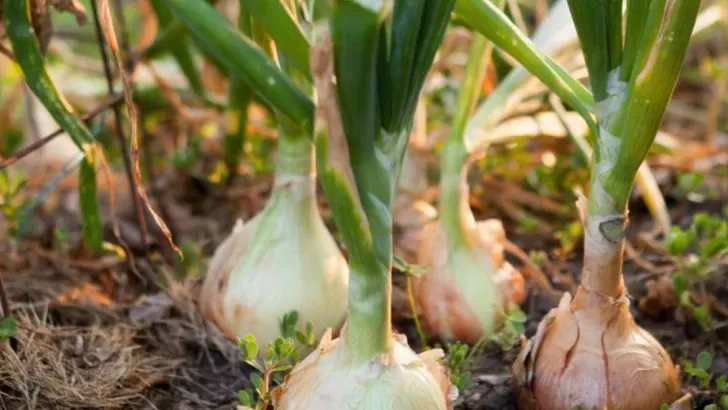Raspberries are delicious and rewarding to grow, but they thrive even better when paired with the right companion plants. Certain flowers, herbs, and vegetables can help repel pests, improve soil health, and boost raspberry production naturally.
In this article, we explore 16 plants you should always grow near raspberries. From pollinator-attracting flowers like marigolds to nitrogen-fixing plants that enrich the soil, these companions will help your raspberry patch stay healthy and productive. If you want bigger, sweeter berries and fewer garden problems, these plant pairings are a must-know!
Garlic
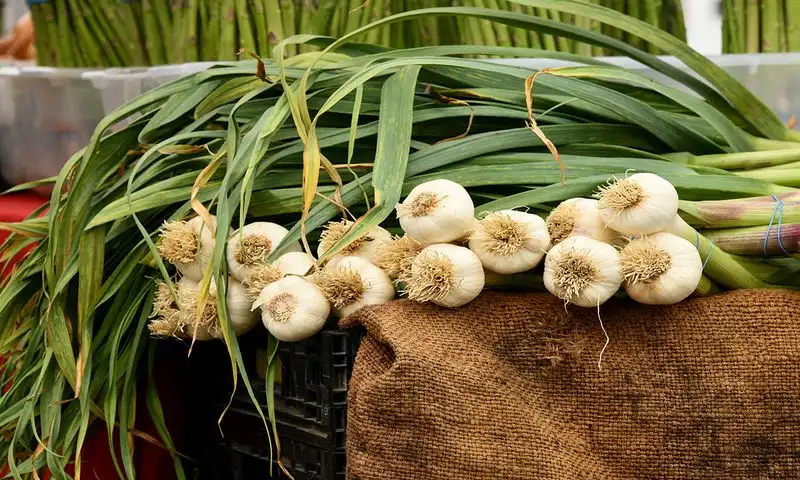
Planting garlic near raspberries acts as a natural pest deterrent. The strong aroma confuses and repels harmful insects and pests that might otherwise plague your raspberries. This aromatic bulb doesn’t just benefit the berries; it’s also a handy addition for any cook’s garden. The symbiotic relationship between raspberries and garlic results in robust plants and a bountiful harvest. Plus, garlic is easy to grow and maintain. Simply plant in well-drained soil, ensuring each clove has space to grow. As they mature, they will lend their protective benefits to your raspberry crop.
Marigolds
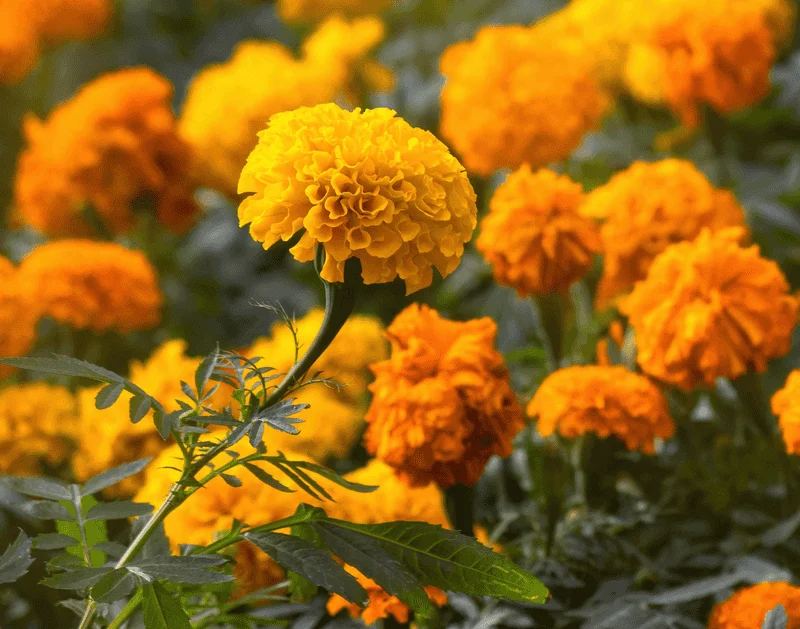
Marigolds are well-known for their pest-repelling properties. Their vibrant flowers not only add a splash of color but also attract beneficial insects. These insects, such as ladybugs and lacewings, help keep aphid populations in check. The natural repellant properties of marigolds can protect your raspberries from nematodes and other soil-borne pests. Easy to plant and maintain, marigolds thrive in sunny spots and are an excellent choice for an organic gardener. Remember to deadhead spent blooms to encourage continuous flowering throughout the growing season.
Chives
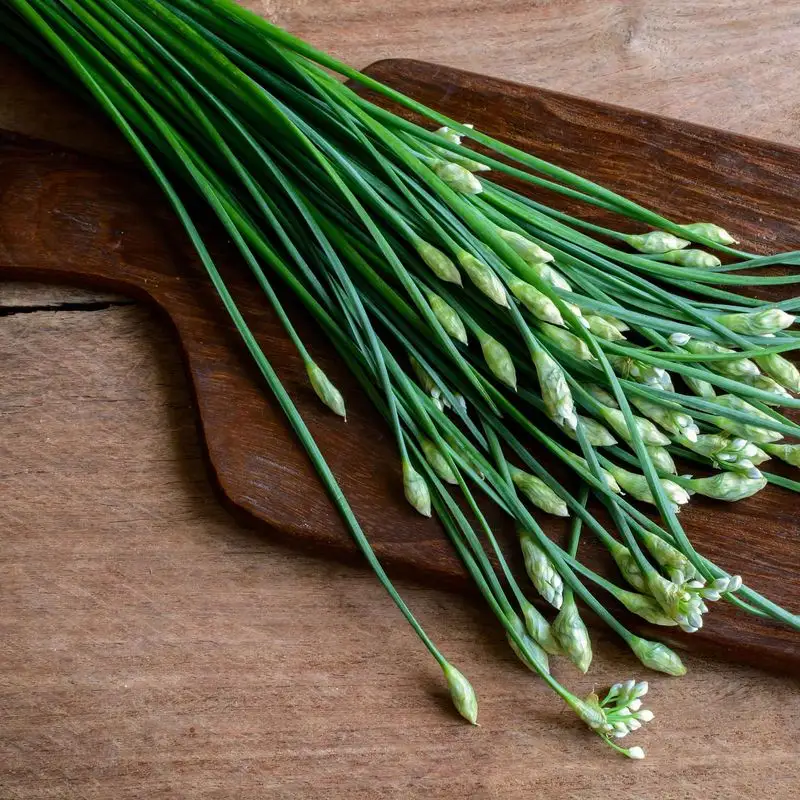
Chives are a versatile addition to any garden, especially when planted near raspberries. Their mild onion scent helps deter aphids, while the flowers attract bees and other pollinators. This dual function aids in both pest control and pollination, crucial for raspberry productivity. Compact and hardy, chives can be tucked into small spaces around raspberry bushes. They thrive in similar conditions, requiring minimal care once established. Harvesting their flavorful leaves provides a culinary bonus, ideal for salads and garnishes.
Tansy
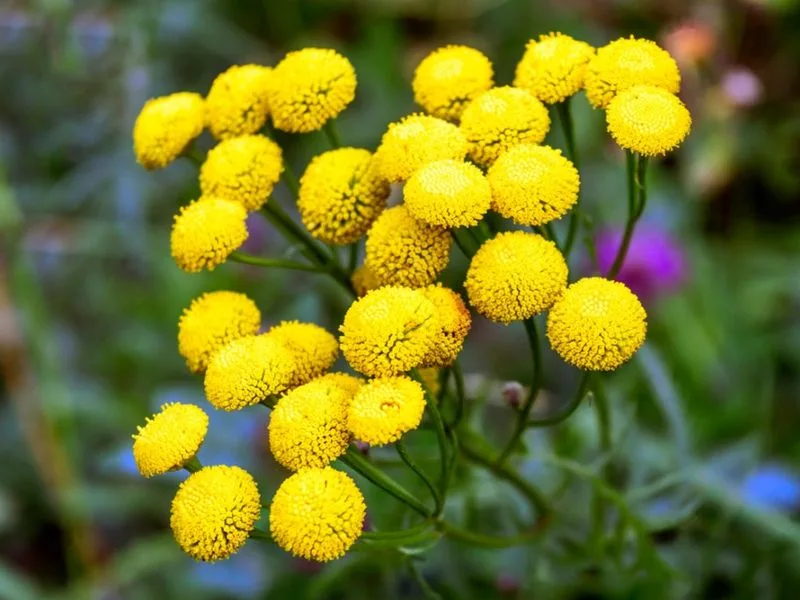
Tansy is a powerhouse when it comes to keeping pests at bay. Its strong scent deters ants, beetles, and other raspberry pests. This perennial herb boasts clusters of golden flowers that are both decorative and functional. Not only does tansy repel unwanted insects, but it also attracts beneficial predators. Plant it near your raspberries to create a natural barrier against pests. While it’s a robust plant, be cautious, as it can spread rapidly. Regular pruning can help keep tansy in check, ensuring it remains a helpful companion.
Mint
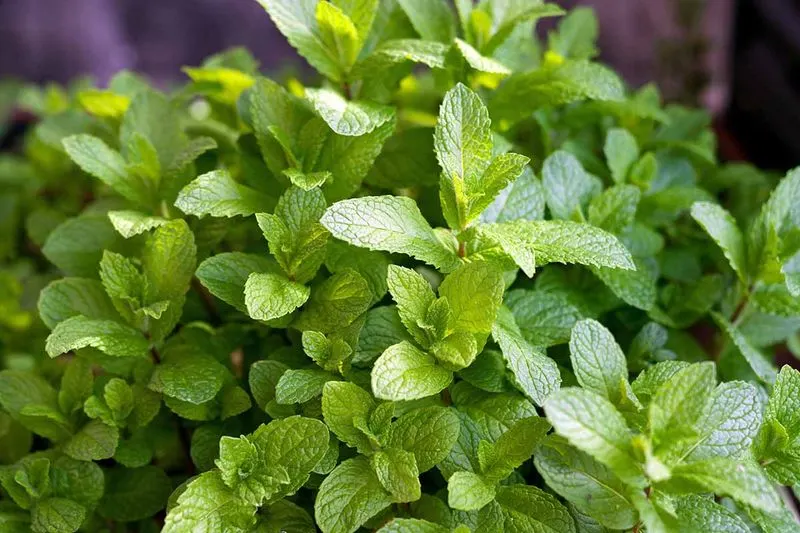
Mint is a fragrant herb that’s beneficial to grow near raspberries. Its scent confuses and deters pests, such as ants and aphids. Mint’s vigorous growth can quickly cover ground, serving as a living mulch to suppress weeds. However, its enthusiasm can become invasive. Plant mint in a controlled manner or containers to prevent it from overtaking your garden. The rewards are worth the effort, as mint also attracts beneficial insects while providing aromatic leaves perfect for teas and culinary uses.
Nasturtiums
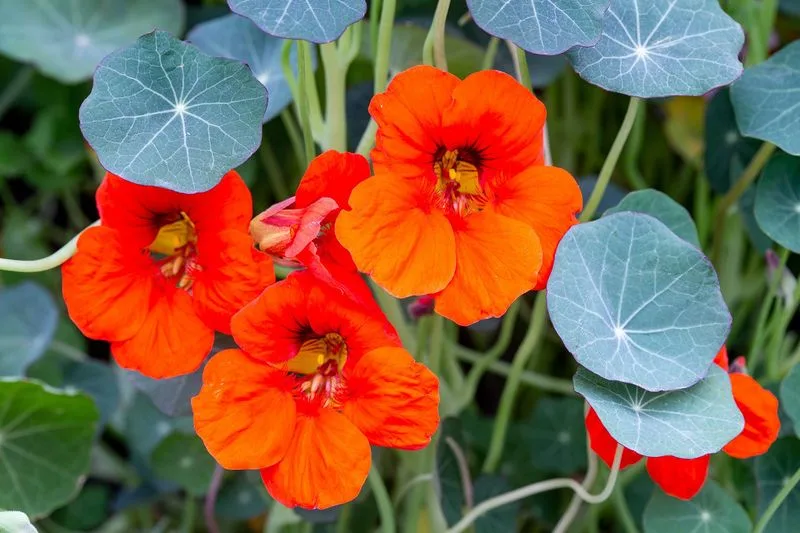
Nasturtiums are not just pretty faces in the garden; they serve as a trap crop for pests. Aphids, in particular, are drawn to nasturtiums, sparing your raspberries from infestation. Their edible flowers and leaves add peppery zest to salads. These easy-to-grow plants thrive in poor soil and require little maintenance. Plant them at the base of raspberry bushes and allow them to sprawl. This strategy not only protects your berries but also enriches your culinary adventures. Enjoy the dual benefits of beauty and protection with these vibrant companions.
Borage
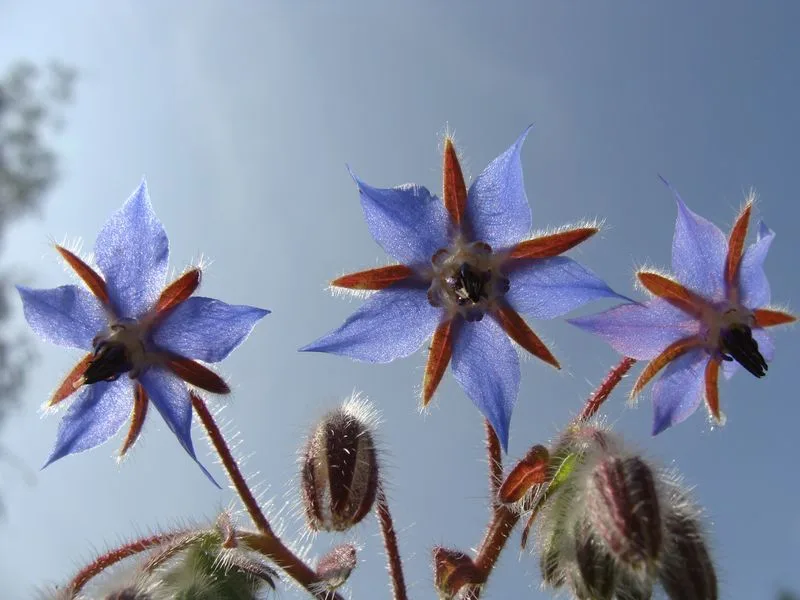
Borage is a hardy annual that brings multiple benefits when planted near raspberries. Its blue, star-shaped flowers attract bees and other pollinators, essential for boosting raspberry yields. Borage also improves soil quality by accumulating trace minerals. As it decomposes, it enriches the soil, benefiting nearby plants. The leaves and flowers are edible, adding a cucumber-like taste to salads and drinks. Growing borage is straightforward; it self-seeds, ensuring a continuous presence in your garden. It’s a multifunctional companion that enhances both the aesthetic and productivity of your raspberry patch.
Comfrey
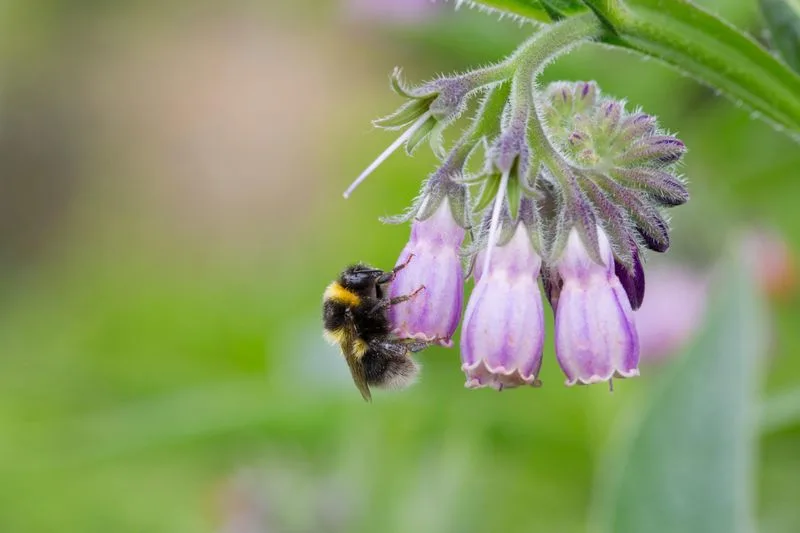
Comfrey is a dynamic accumulator, drawing nutrients from deep within the soil. Its large, lush leaves make excellent mulch, decomposing to enrich the soil with nitrogen and potassium. This process supports healthy raspberry growth and fruit production. Comfrey’s flowers attract pollinators, enhancing the productivity of your raspberry plants. While it spreads vigorously, it’s best planted in areas where it can thrive without overtaking other plants. Consider its placement carefully, as comfrey will become a perennial fixture in your garden. This robust ally ensures your raspberry bushes are well-nourished and fruitful.
Yarrow
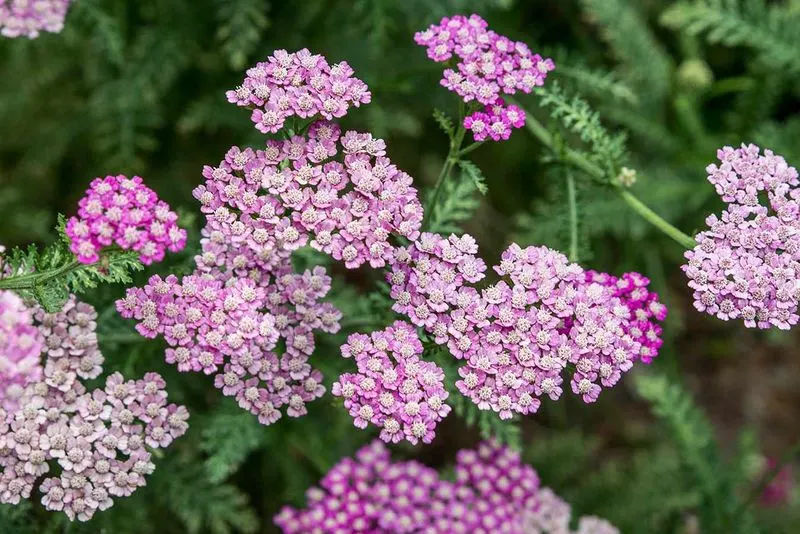
Yarrow is a hardy perennial that serves as an excellent companion for raspberries. Its feathery leaves and clusters of tiny flowers attract beneficial insects like butterflies and ladybugs. These predators help control pest populations naturally. Yarrow also improves soil quality by breaking up compacted soil, allowing for better water and air circulation. This plant is drought-tolerant, making it a low-maintenance addition to your garden. Known for its medicinal properties, yarrow is a thoughtful choice for an ecologically balanced garden. Let this resilient plant enhance both the beauty and health of your raspberry patch.
Onions
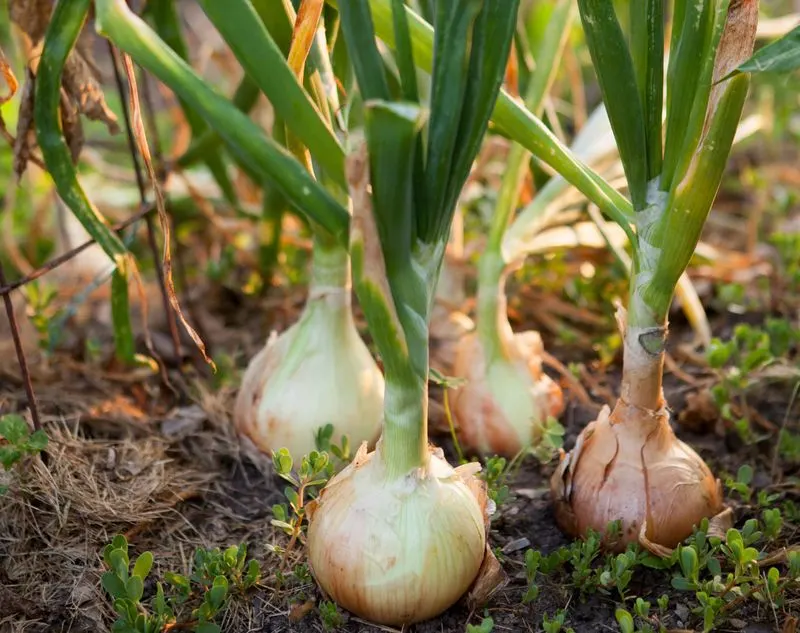
Onions are more than a kitchen staple; they’re a great companion plant for raspberries. Their pungent aroma deters pests such as aphids and spider mites. Onions also improve soil health by adding sulfur, a natural antifungal agent. Plant them in well-drained soil alongside your raspberries to maximize their protective benefits. As they mature, they won’t overshadow your berries, making them a practical choice for interplanting. Onions are easy to grow and can be harvested in stages, allowing for a continuous supply. Their compatibility with raspberries makes them a wise addition.
Sage
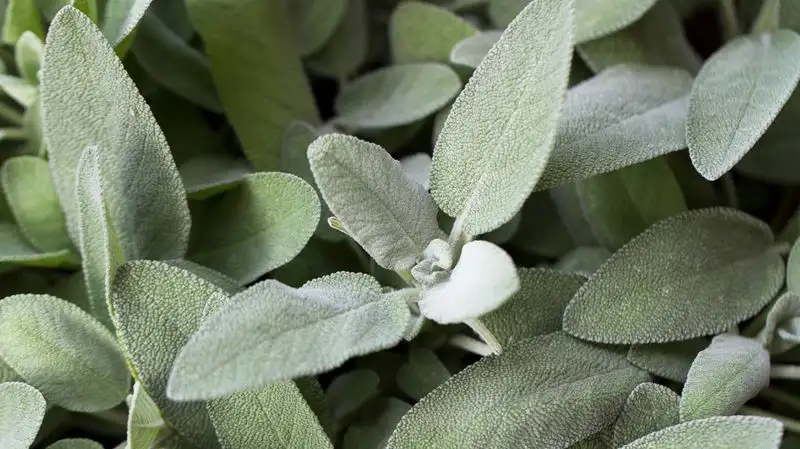
Sage is a perennial herb that complements raspberries beautifully. Its aromatic leaves deter pests like slugs and beetles, while its flowers attract pollinators. This herb prefers well-drained soil and full sun, thriving in similar conditions as raspberries. Sage’s compact growth habit means it won’t compete for space or nutrients. Regular pruning encourages bushy growth, enhancing its effectiveness as a companion plant. Besides its pest-repelling properties, sage offers culinary uses, providing flavorful leaves for cooking. Integrate sage into your raspberry patch for a harmonious and productive garden.
Thyme
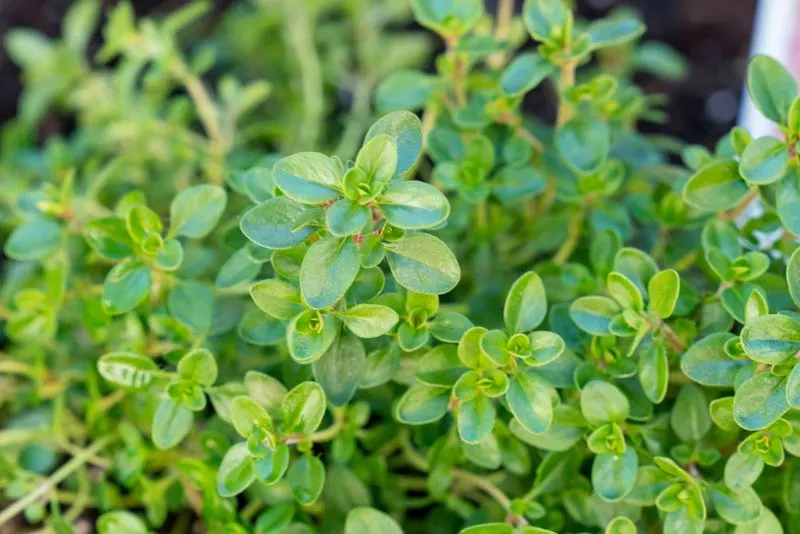
Thyme is a compact herb that makes an excellent ground cover around raspberries. Its dense growth smothers weeds, reducing competition for nutrients. The aromatic oils in thyme leaves repel pests, creating a protective barrier for your berries. Thyme thrives in well-drained soil and sunny conditions, perfectly aligning with raspberry cultivation needs. Harvesting thyme is simple, and its leaves enhance many dishes with their earthy flavor. This herb’s low-growing nature means it won’t overshadow your raspberries, making it a practical and aesthetic choice for companion planting.
Lavender
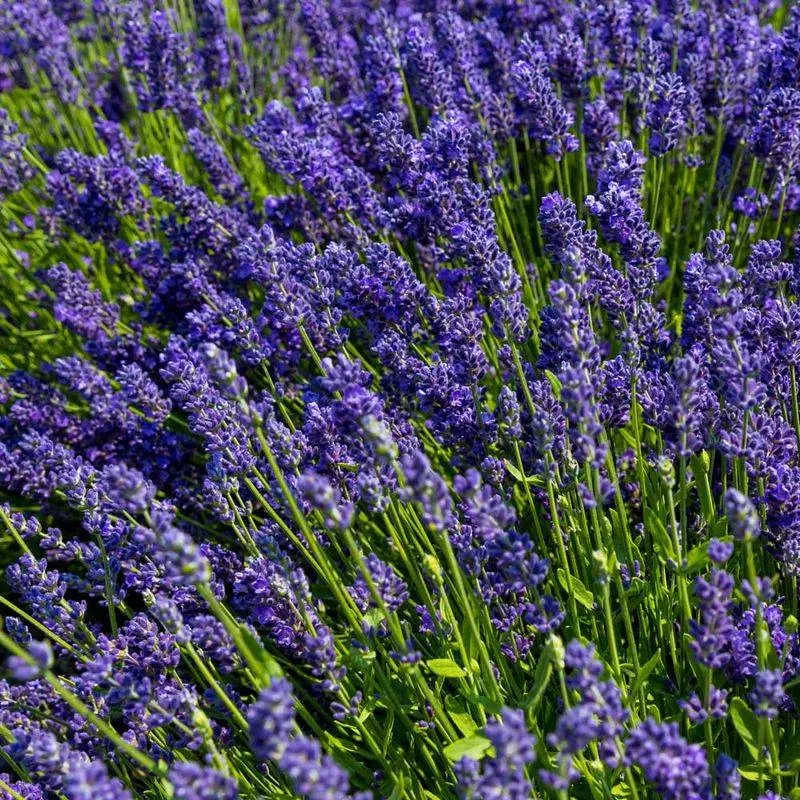
Lavender’s fragrant blooms not only add beauty but also repel insects such as mosquitoes and moths. This hardy perennial attracts pollinators, enhancing raspberry production. Lavender thrives in sandy, well-drained soil, similar to what raspberries prefer. Its drought-tolerant nature means it requires minimal care once established. Besides its pest-repelling benefits, lavender adds a calming aroma and is perfect for crafting aromatic sachets. Plant lavender near raspberries to enjoy a garden filled with fragrance and productivity. Its compatibility with other plants makes it an excellent choice for diverse plantings.
Sunflowers
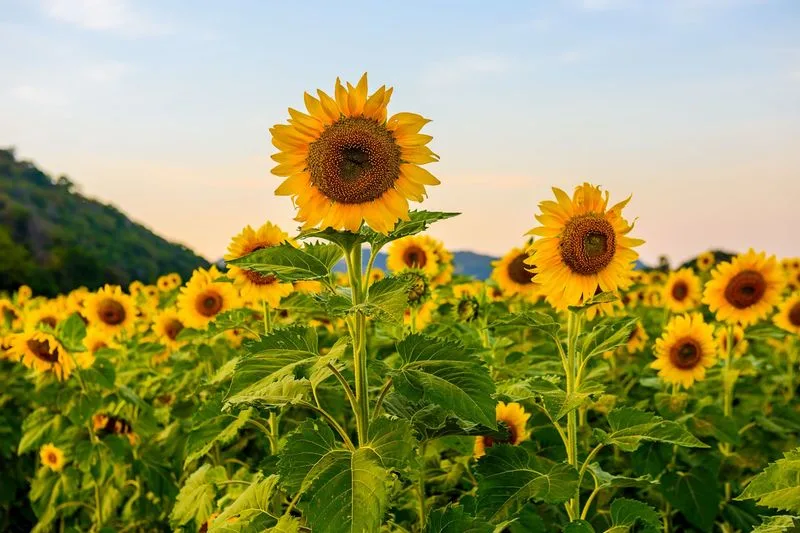
Sunflowers bring more than just a cheerful presence to your garden. Their towering stalks provide shade for raspberries, preventing sun scorch during hot summer days. The seeds attract birds that also feed on insect pests, offering natural pest control. Sunflowers’ deep roots improve soil structure, aiding water penetration and retention. Plant them on the north side of raspberry patches to avoid overshadowing the berries. As an added benefit, sunflower seeds can be harvested for human consumption, providing a tasty and nutritious snack. These multifaceted plants are a joyful addition to any raspberry garden.
Chamomile
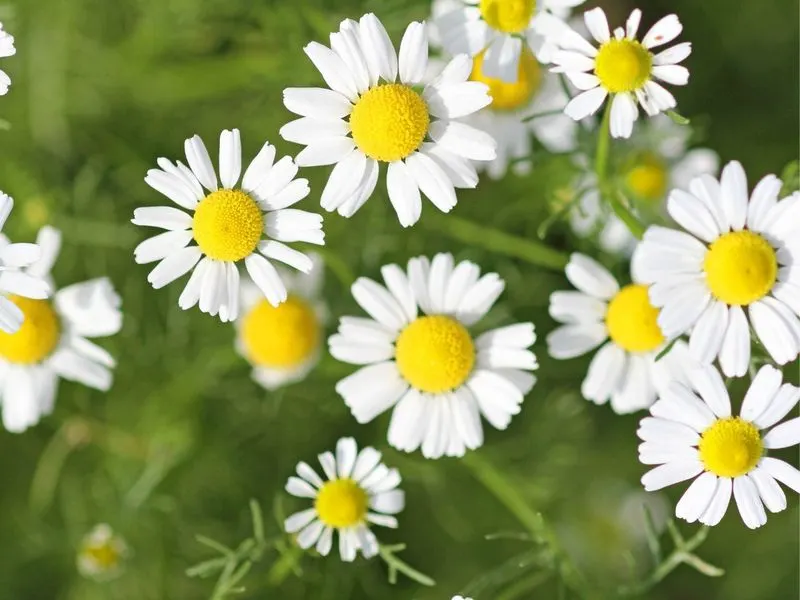
Chamomile is an understated yet powerful companion plant for raspberries. Known for its calming properties, it also attracts beneficial insects like hoverflies and predatory wasps. These help control aphid populations naturally. Chamomile improves soil health by adding calcium and potassium, essential for raspberry growth. This herb thrives in well-drained soil and full sun, making it compatible with raspberries. Chamomile’s dainty flowers are a visual delight, and the blooms can be harvested for soothing teas. Plant chamomile near your raspberries to enhance both garden aesthetics and plant vitality.
Clover
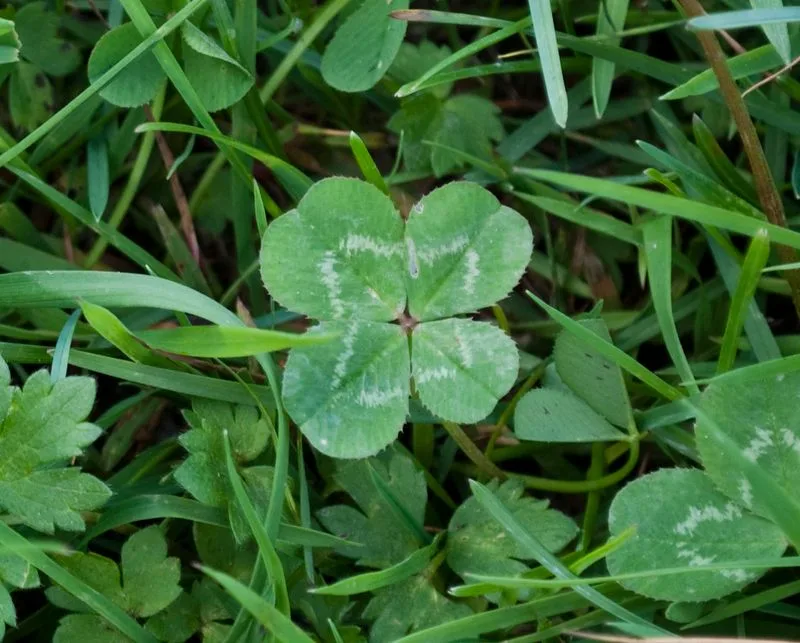
Clover is a perfect ground cover for raspberry gardens, offering multiple benefits. It fixes nitrogen in the soil, enriching it for nearby plants. This process supports the growth of healthy, productive raspberries. Clover’s dense growth suppresses weeds, reducing competition for resources. Its flowers attract beneficial insects like bees, aiding in pollination. Clover is drought-tolerant and thrives in various soil conditions, making it a resilient choice. Consider using clover as a living mulch to maintain moisture and support a thriving raspberry patch. Its contributions to soil health and biodiversity make it invaluable.

